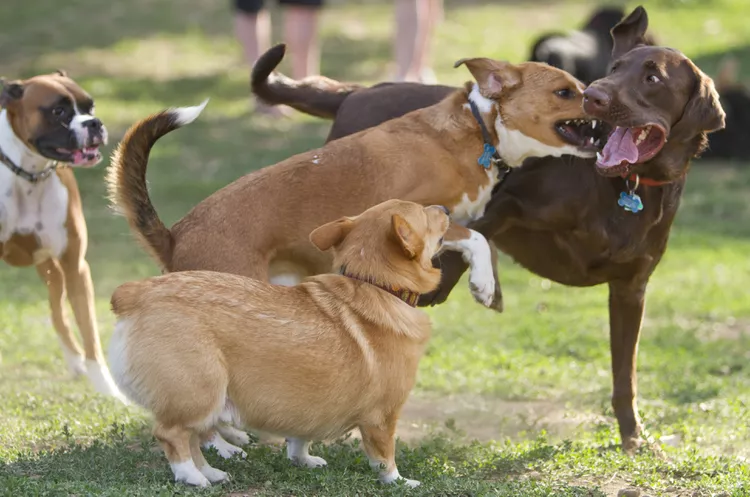Dog Park Etiquette

Dog parks can be a lot of fun for dogs. They get a chance to run and play off-leash with other dogs. However, dog parks can be an accident waiting to happen if you're not careful. Also, if you don't know the basic rules of going to the dog park, you can ruin it for everyone else.
Some Dogs Don't Belong At the Dog Park
Dogs that have not been fully vaccinated should not be in a dog park. This includes puppies under the age of 16 weeks. They can come into contact with diseases they don't have immunity against. In addition, small puppies may be injured by larger adult dogs.
Only bring healthy dogs to the dog park. Your dog should be fully vaccinated, on heartworm prevention and parasite prevention, and free from any signs of illness or injury. You don't want to get the other dogs sick.
Don’t bring aggressive dogs to dog parks or anywhere else dogs play off-leash. A dog park is no place for any dog with a history of aggression towards humans or other dogs. Find alternative ways to entertain and exercise your dog. Consider training or behavior modification.
Never bring an intact female (not spayed) in heat to the dog park. There could be an intact male (not neutered) dog that cannot control himself. You are probably not planning to breed your female to some random dog. Worse, if more than one intact male is in the park, they could start a fight over your female in heat. Don't risk it.
On that note, don't bring an intact male to the dog park in case there may be an intact female in heat.
Better yet, spay or neuter your dog!
The Dog Park is Not for Little Kids
Avoid bringing babies and small children to the dog park. Dogs can easily run into a small child when playing. They may get a little too curious about the baby or child you are holding. Also, remember that you don't know the other dogs in the park. A running child could set off another dog's prey drive, leading to disaster. You're better off letting another adult take the kids to the playground while your dog plays in the off-leash area.
Parasites are another reason children don't need to be roaming around strange dogs (and possibly dog poop). Some parasites are even more harmful to children than to dogs.
Is Your Dog Ready for the Dog Park?
Before heading to the dog park, make sure you have a well-socialized dog. The dog park is not the place for your dog to become socialized. Ideal socialization happens in a controlled environment. Any dogs entering the dog park should already have a good foundation of socialization so they all know how to act around each other. Plus, an un-socialized dog may pick up some unwanted behaviors at the dog park.
Be sure you have good verbal control of your dog before letting him off the leash. Your dog should have a good foundation of training and know basic obedience cues. It is essential that your dog has an excellent recall. An emergency recall is useful as well.
How To Behave at the Dog Park
Most dog parks have rules posted outside the gate. Be sure to read and follow them. This will benefit you, your dog, and others.
Have a good look around the park before entering. Don’t bring your dog in if the park seems overcrowded or if there is already bullying or aggressive behavior happening.
If it's an off-leash park, be sure to take your dog off the leash before entering. A leashed dog can feel vulnerable around loose dogs and may lash out in defense. Most dog parks have a double-gated area where you can let your dog off the leash before letting your dog into the dog park.
If several dogs charge the gate as you are entering, wait until they clear before you let your dog in. Ask the other owners to call their dogs away if needed.
If there is a separate area for smaller dogs, bring your small dog there. Don’t bring small dogs to the big dog area, nor big dogs to the small dog area. If there is no separate area, then use extra caution at the dog park. Watch to make sure the dogs playing are close enough in size that the smaller ones are not at risk.
Always pick up after your dog; no one wants to step in poop. Plus, some dogs like to eat or roll in other dogs' poop. Be courteous. Bring bags, pick up the poop, and dispose of it properly.
Avoid bringing toys, especially if your dog has resource guarding issues. If so, keep your dog away from toys inside the dog park (or remove the toys).
Supervise your dog at all times. You are not at the dog park to socialize with other humans or to play on your phone. Watch your dog closely. Be sure to call your dog away if things are not going well (bullying behavior, excessively rough play, aggression, etc.). It's time to leave the park if things get out of control or if your dog becomes tired or bored.
It's important to know that if your dog injures another dog, it is your responsibility. Following the above guidelines will decrease the chances of problems, but accidents do happen. Be prepared to take responsibility if something does happen.